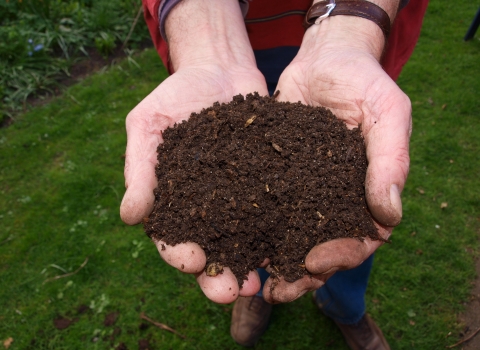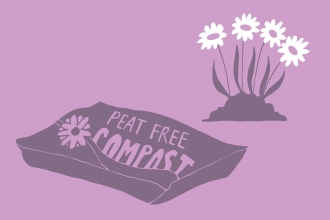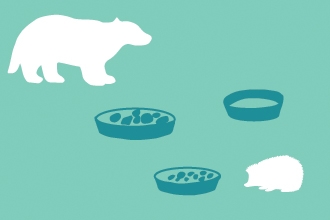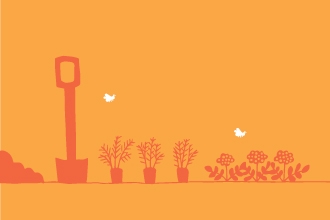Why worms are great
These wriggly fellows are well known to gardeners all over. At first glance they might not seem particularly special, but they’re essential for our soils and for wildlife. Charles Darwin called them the most important animal in the history of the world! He dubbed them ‘nature’s ploughs’ for the way they mix soil layers and enable plants – the basis of all terrestrial life – to grow.
Earthworms are true engineers. They plough through the soil mixing the earth, oxygenating it and allowing better drainage of water. They also eat organic matter, such as dead leaves, and break this down releasing nutrients which help increase soil fertility.
Welcoming worms into your garden
Encouraging earth worms into your garden is an ongoing process, but once you've mastered the basics you'll soon see them settling in, and it will benefit your garden plants too!
Feed your soil
Whenever planting, take the opportunity to work a little peat-free garden compost into the soil. Collect leaves in the autumn for leaf mould and use it to mulch acid-loving plants like rhododendrons, or add to a home potting compost mix.
Add veggie peelings
The highest concentration of worms are often found in vegetable gardens and allotments. All the good stuff gardeners add to these patches, such as manure and garden compost, give worms plenty to feed on. Happily the free-draining, moist soil, which suits our veggies, is a favourite of worms too. And, perhaps surprisingly, earthworms aren’t too bothered by a bit of digging!
Worms also love your veggie peelings, so cut down on your waste and enrich your soil at the same time.
Be a bit messy
Let plants die down naturally in winter and don’t be too quick to clear fallen dead leaves from the soil – unless they are diseased. Leave small stacks of logs, sticks or woody prunings directly on the soil. They will eventually decompose into worm food.
Worms as food
Worms are an important part of food chains and many other animals rely on them as part of their diet. Here are just some of the animals that feed on earthworms...
Compost your waste
The benefits of composting your garden and kitchen waste are two-fold. We’re reducing the amount of waste sent to landfill and providing a food source for worms and a habitat for a number of minibeasts. The community of minibeasts who live among the waste help the decaying process, and in turn, these beasts are a delicious food source for hedgehogs and other animals.
In addition to saving you money, the increased organic content in your soil will boost fertility and help plants to build up resistance to disease and insect attack, reducing the need to use chemical controls. The compost will also improve the structure of the soil by increasing the numbers of worms, helping to keep it healthy.
All you need for a successful compost heap is waste, air and water! A simple heap covered with old carpet or plastic is just as effective as a 'bin'. The only advantage of a container is they look tidier and could be easier to manage.
What to put in your compost
- Grass cuttings
- Fruit and vegetable scraps
- Cardboard
- Old cut flowers and bedding plants
- Dry leaves and weeds
- Tea bags and coffee grounds
- Gerbil, rabbit, hamster and other vegetarian pet bedding
- Egg shells – these help to keep the heap from smelling
- Newspapers – shredded paper can help to soak up excess moisture in a heap
Tips for composting
- Ensure you have a good mix of items. If you have large amounts of compostable items to dispose of, such as hedge trimmings or bags of cut grass it is worth contacting your council to see if they have a municipal composting scheme
- It will work best if you add a fair quantity of material at a time so it is perhaps best to save up you kitchen scraps and then add them to the heap along with some prunings or redundant old bedding plants
- It is important to mix the contents of the heap every now and again to aerate it, helping to aid decomposition
Remember: Do not compost cooked food, coal and coke ash, meat and fish, cat litter, dog faeces, disposable nappies, or glossy paper.
Go peat free!
By buying peat-free compost you can help to protect precious peatland habitats for wildlife and people.
What is peat?
Peat is made up of a mix of partly decomposed plant materials, unique to natural areas called peatlands. In the UK peatlands are some of our wildest places, home to a range of special plants and animals.
Why do we need peatlands?
Peatlands provide benefits for people too; the UK’s peatlands store around 4,500 million tonnes of atmospheric carbon (that’s 100 times more than all UK vegetation including trees), (http://jncc.defra.gov.uk/page-5547). And 70% of our drinking water comes from peatland river catchments.
Going peat-free
Sadly, our peatlands have been suffering for many years and currently 80% of the UK's peatland are in poor condition. But peat-free compost is available – if everyone used it our peatlands would safe from this type of damaging practice. It’s often not the first compost you see, or necessarily the cheapest, but if you ask most stores should stock it. By buying peat free you’re helping our precious peatlands and sending a message to manufacturers that people want peat free products. Both are really important.
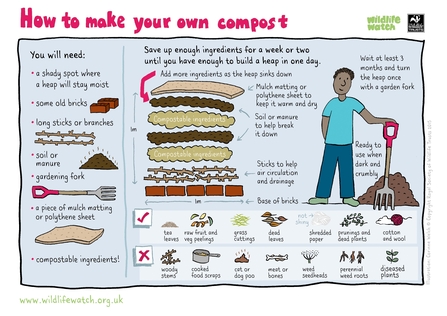
- Go Wild for Worms (http://live-twt-d8-lincolnshire.pantheonsite.io/sites/default/files/2018-05/18412%20WAG%202017%20Booklet%2016pp%20LOW%20RES%20DOUBLE_1.pdf)
- Wild About Gardens (http://www.wildaboutgardens.org.uk/)
- Making Compost (http://live-twt-d8-lincolnshire.pantheonsite.io/sites/default/files/2018-05/makingcompost.pdf)
More actions for wildlife
There's lots of small things you can do in your garden, courtyard of windowsill that will benefit wildlife. Take a look at some simple ideas below to see how you can take action for wildlife.

